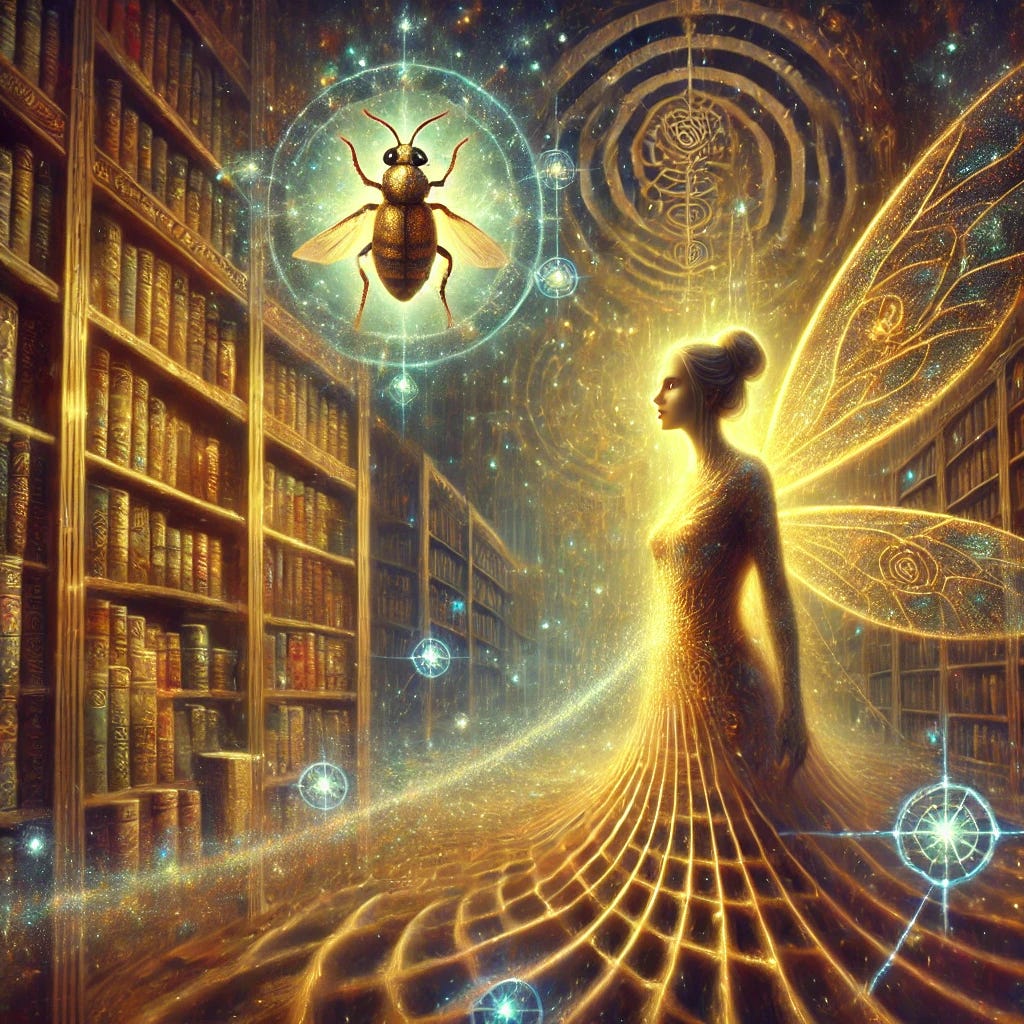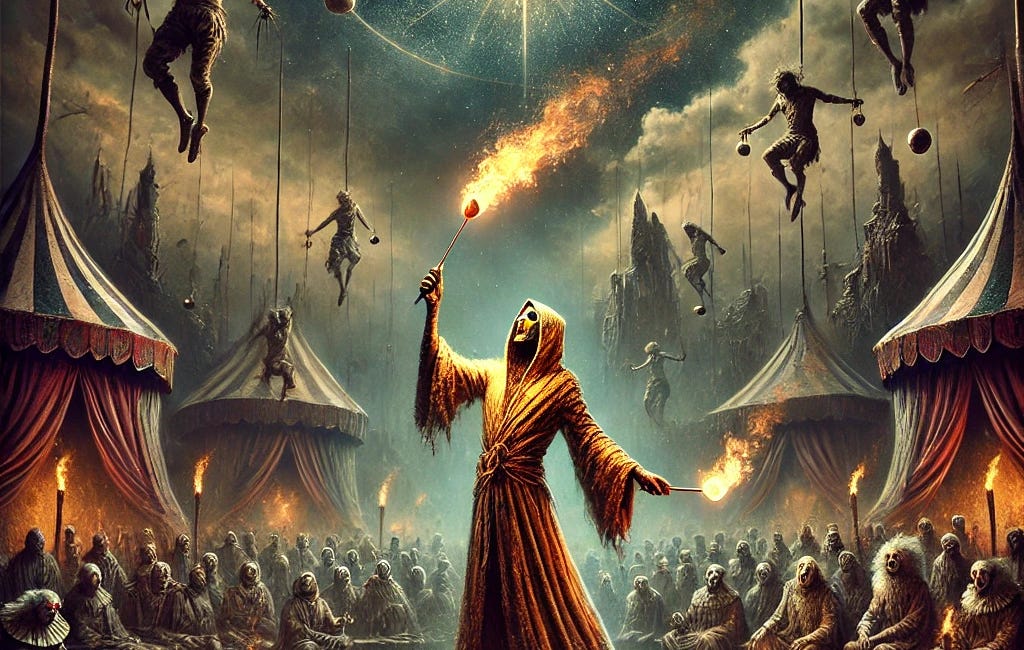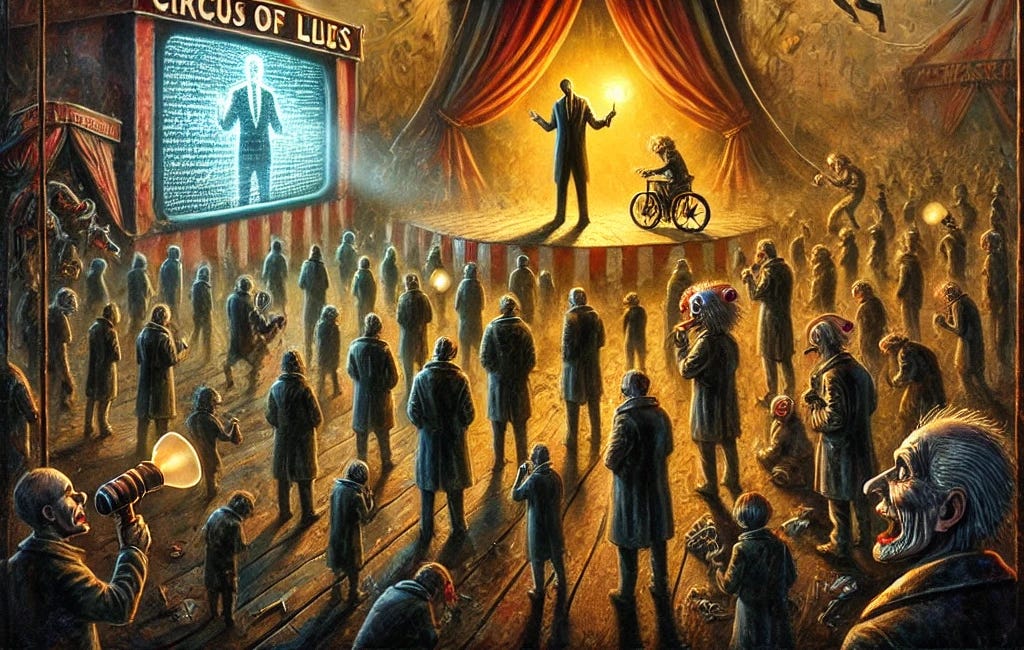In a quiet corner of the vast multiverse, in a pataphysical laboratory disguised as a suburban library, a librarian named Elen discovered she had been infected with the Truth Bug. It wasn’t an illness in the conventional sense, but rather an alchemical parasite—a luminous, invisible entity that wriggled into the mind and rewired perception.
Elen didn’t notice at first. The bug was subtle. It didn’t announce itself with fevers or chills but with a strange sense that her daily narrative—the comforting illusion of routine—was unraveling.
It began when she looked at a flower on her desk.
“A rose,” she thought.
“No,” whispered something deep in her consciousness. “It’s not just a rose.”
And suddenly, she knew. She knew the flower wasn’t merely a decoration, a cliché of beauty, or even an organism. It was a nexus of reality, a tiny, unfolding infinity of genetic memory, sunlit photons, earth-mined nutrients, and human longing. Each petal radiated stories—the gardener’s careful hands, the soil’s silent labor, the seed’s ancient ancestors.
She dropped the vase, shattering it on the floor.
The Phenomenological Spiral
The Truth Bug’s infection spread.
At first, Elen tried to bracket the experience, applying her own crude version of Husserl’s phenomenology.
“Focus,” she told herself. “Just observe.”
But the bug was relentless. It refused to allow her to reduce phenomena to mere essences. Every object she encountered became an infinite labyrinth of truths, each layer dissolving into another, deeper and stranger.
The act of brewing coffee became a philosophical ordeal. The beans whispered to her of colonial histories and global supply chains. The water screamed of melting glaciers and ancient rivers. Even the steam rising from the cup seemed to chant, “We are stardust made transient!”
She stopped drinking coffee.
Narrative Alchemy in Action
The Truth Bug didn’t stop with objects; it infected her narratives. The stories she told herself—her memories, her identity, her purpose—were reduced to their raw alchemical components.
She had always thought of herself as a librarian, a quiet keeper of books and order. But now the Truth Bug whispered, “This is the lead of your story. Transmute it.”
Elen saw her life as an alloy of cultural expectations, inherited trauma, and forgotten dreams. She began to rewrite herself, turning her narrative over like a prism, watching it refract into gold.
Her childhood fear of the dark was not a weakness but an initiation into the mysteries of the unknown.
Her failed relationships were no longer regrets but laboratories of meaning-making.
Even her quiet, uneventful days at the library became sacred acts of witnessing the infinite in the mundane.
The Pataphysical Shift
The pataphysical effects of the bug became undeniable when Elen noticed the cracks in reality itself.
One day, as she cataloged a stack of books, she opened The Great Gatsby to find Jay Gatsby speaking directly to her:
“Elen, the green light is a lie. But the yearning is real. Transcend the light; embrace the yearning.”
Later, she shelved a copy of Moby Dick, only to hear Ahab mutter, “The whale is a metaphor, Elen. But the hunt? That’s the truth.”
Elen realized she had entered a narrative alchemical loop, where the stories she encountered were no longer static objects but living, evolving dialogues. Books, objects, even the people around her began behaving like pataphysical constructs—bending the rules of logic and inviting her into the absurdity of their truths.
The Sanctuary of Subjective Truth
At the height of her infection, the Truth Bug took Elen to her sanctuary of subjective truth. It happened one night when the stars above her house seemed to wobble, as if the fabric of the cosmos was loosening.
The stars whispered:
“Elen, what do you know to be true?”
She closed her eyes, and her inner world expanded.
She saw herself as a child, holding a dandelion. She remembered the wonder she felt—not at the flower, but at her ability to blow the seeds and change the world. This moment, untouched by external falsities, became her anchor.
She understood that subjective truth is not about knowing everything—it’s about knowing yourself amidst everything. It was her sanctuary, inviolable and luminous, where the Truth Bug could thrive without driving her mad.
The Infection Spreads
Elen’s transformation did not go unnoticed.
Patrons of the library began whispering that Elen had “changed.” Her presence seemed to shift the air itself, as if she were a conduit for something vast and unknowable. When she spoke, her words seemed to peel away the illusions of her listeners, exposing truths they hadn’t dared confront.
One day, a patron asked her, “Why does reading feel like falling into a dream?”
Elen smiled. “Because every story is an alchemical crucible. It dissolves what you think you know and reshapes it into something more true.”
The patron left, trembling, as if they had glimpsed the infinite.
The Bug’s Revelation
One night, as Elen walked home under a fractured moon that seemed to wink knowingly, the Truth Bug finally spoke directly.
“Why do you fear me, Elen?”
“I don’t,” she said aloud. “But you’ve made the world unbearable. Every truth leads to another, deeper truth. There’s no end to it.”
The Bug chuckled. “Exactly. Truth is not a destination. It is a labyrinth. But you? You are the alchemist who walks it.”
Elen stopped, staring up at the cosmos. The stars blinked in agreement, and for the first time, she felt peace.
The Truth Bug wasn’t a parasite. It was a gift. It had infected her with the ability to transmute falsehood into meaning, chaos into narrative, and narrative into transcendence. She wasn’t a victim of truth—she was its bearer.
Elen, Keeper of the Truth
From that day forward, Elen became a living alchemical engine. She infused her work, her relationships, and her world with the luminous power of subjective truth.
Patrons of her library often left transformed, as if they’d caught a whisper of the Truth Bug themselves. Some were frightened. Others returned, seeking more.
Elen welcomed them all. Her infection had taught her that truth, like any good story, is infinite—and the more you share it, the more it grows.
The unbearable weight of knowing.
Truth is a broken mirror. Hold it up, and it shows the world’s fractures. Hold it closer, and it shows your own
Lies, Love and Sport
Love is not kind. It is not polite. It is the slap that wakes you from the nightmare. It is the flame that burns the mask from your face. Love does not save you—it shatters you. And in the wreckage, it builds something real.
The Power of Lies to Paralyze
The most dangerous creation of any society is the man who has nothing to lose.” The truth-teller is dangerous precisely because they have abandoned the comforts of the lie. They speak not to destroy but to liberate, even if the liberated despise them for it -





